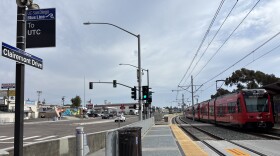President Obama on Thursday ordered government agencies to strengthen the criteria for putting individuals on U.S. terrorist watch lists — especially the no-fly list — in an effort to ensure the safety of American travelers after a near-disaster on Christmas Day.
"We must do better in keeping dangerous people off airplanes while still facilitating travel," the president said at an afternoon briefing.
Days after ordering a review of the security breakdown that enabled a Nigerian man to board a Detroit-bound plane carrying explosives, Obama admitted the U.S. had information that should have prevented Umar Farouk Abdulmutallab from boarding the flight.
But, Obama said, the information was "scattered throughout the system" — preventing agencies from connecting and understanding the available intelligence. "Rather than a failure to collect or share intelligence, this was a failure to connect and understand the intelligence that we already had," Obama said.
In an effort to head off future lapses, Obama has directed the intelligence community to immediately begin assigning specific agencies to investigate leads on high-priority threats in an effort to ensure that all leads are pursued aggressively and rapidly.
The president also ordered a review of the process for reviewing and revoking visas; pursuing the use of enhanced screening technologies and procedures; and coordinating with global partners on aviation security issues.
A somber Obama also took responsibility for what he termed "a systemic failure" to identify the Christmas Day threat.
"Ultimately, the buck stops with me. When the system fails, it is my responsibility," Obama said, adding that he would hold his national security staff accountable for implementing changes.
Security and intelligence officials have come under fire over the last two weeks for failing to connect the dots that would have prevented a young Nigerian man from boarding a U.S.-bound plane with explosives concealed in his underwear.
Authorities said Abdulmutallab planned to blow up a Northwest Airlines plane from Amsterdam to Detroit, but failed because he couldn't detonate the 80 grams of Pentrite, or PETN, he was carrying. Passengers onboard the flight subdued Abdulmutallab, averting potential disaster.
At a security briefing later on Thursday, Homeland Security Secretary Janet Napolitano sought to reassure the traveling public, saying several layers of enhanced security are being added.
Napolitano told reporters that the number of air marshals onboard planes will be increased and the department will move ahead with previous plans to deploy more full-body scanners at U.S. airports. Currently, 40 such scanners are in use around the country and at least 300 additional units will be deployed this year, she said.
In addition, Napolitano said she will go to Spain later this month to meet with international partners in an effort to improve global aviation security.
Security Adviser Predicts 'Shock'
Earlier this week, the administration ordered tighter screening for U.S.-bound air travelers — particularly those with terrorist ties — including possible pat-downs, increased law enforcement and use of canine security teams.
White House national security adviser James Jones predicted Americans would feel "a certain shock" when they read the account of the missteps that allowed the Nigerian man to board a Northwest Airlines flight.
"The man in the street will be surprised that these correlations weren't made because there was data out there," Jones said in an interview with USA Today. "There was a number of things that could have triggered a prevention of this individual ever getting on an airplane."
Jones said U.S. agencies would learn from their mistakes and are already taking steps to avoid a repeat.
"The question will be if we need more analysts, if people are overworked, or the workload is too much for a particular group of people. We can get more people to fix that," he said. "So, the intelligence community will figure this out, I'm quite sure."
Prior Warnings
Obama said U.S. intelligence agencies had information that the al-Qaida affiliate in Yemen was planning an attack in the U.S. — and was in the midst of trying to recruit operatives.
But although Abdulmutallab's father had warned officials at the U.S. Embassy in Nigeria that he was afraid his son had been recruited by al-Qaida extremists in Yemen, authorities have said that agencies failed to connect bits of information that could have prevented Abdulmutallab from attempting an attack.
On Thursday, an administration official said Customs and Border Protection officers were planning to question Abdulmutallab when his flight landed in Detroit — an acknowledgment that a record of the suspect was already in the intelligence database.
Abdulmutallab, 23, was indicted by a federal grand jury in Detroit on charges that he attempted to use a weapon of mass destruction to blow up a plane in route from Amsterdam to Detroit on Dec. 25.
He is scheduled to be arraigned Friday.
Enhanced Security
According to a Transportation Security Administration directive released Sunday, all passengers traveling from nations that are state supporters of terrorism or other "countries of interest" are required to go through enhanced screening. Passengers flying into the U.S. from countries without terrorist links will be subject to increased, random screening, the TSA said.
"Because effective aviation security must begin beyond our borders ... TSA is mandating that every individual flying into the U.S. from anywhere in the world traveling from or through nations that are state sponsors of terrorism or other countries of interest will be required to go through enhanced screening," stated a TSA directive issued Sunday.
The TSA didn't name the countries of interest, but officials said the directive included nations on the State Department's list of state sponsors of terrorism. Cuba, Iran, Sudan and Syria are listed on the State Department's Web site as having that designation.
Afghanistan, Algeria, Iraq, Lebanon, Libya, Saudi Arabia, Somalia, Nigeria, Pakistan and Yemen are among the "countries of interest" that will be affected.
Copyright 2022 NPR. To see more, visit https://www.npr.org. 9(MDAzMjM2NDYzMDEyMzc1Njk5NjAxNzY3OQ001))






